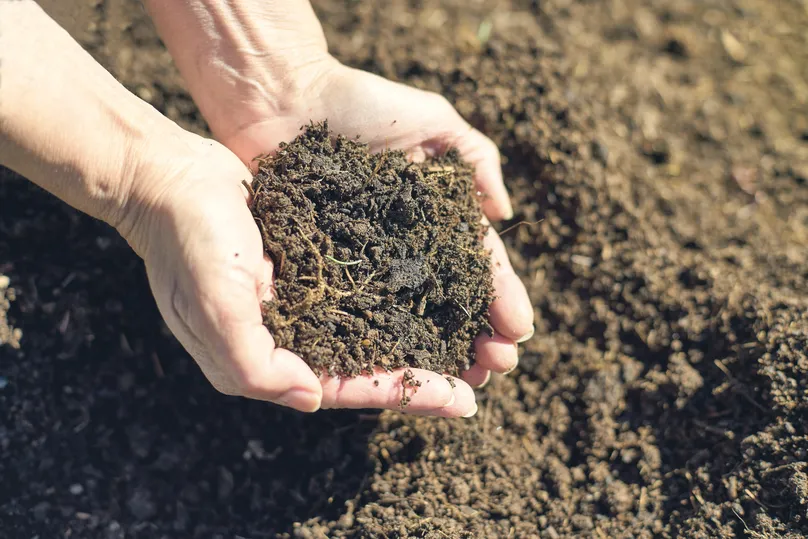Recycled organics
Recycled organic material refers to products made from organic waste that have been processed and repurposed for use. These products include compost, soil conditioners, mulch, and other materials used in landscaping or soil treatment.
Organic waste, also known as biowaste, consists of biodegradable material derived from plants or animals. Examples include green waste, food scraps, food-soiled paper, non-hazardous wood, timber, and pruning waste. This biodegradable material can break down into carbon dioxide, methane, or simpler organic molecules through natural processes.
How is it processed?
The processing of solid organic waste involves several stages to ensure compliance with regulatory controls and requirements, enabling the material suitable for its intended use. Generally, the recycling process can include:
- collection of garden and food organics to be sent to a local organic resource recovery facility
- decontamination
- shredding and stacking
- composting
- screening and grading
- converting into recycled solid organic products
Environmental, health, and safety
Australian Standards measures are in place for managing organic waste. These measures are applied to manage any risks associated with contaminants in the feedstock, ensuring that concentrations comply with environmental regulations. Current research shows no conclusive evidence that the typical levels of organic contaminants found in recycled organic materials pose a hazard to surrounding environments, such as soils and groundwater, or to human health.
Additionally, odour control measures are implemented to manage feedstock and minimise environmental and human health risks on-site.
Applications
Recycled organics can be used in a number of applications including:
- topsoil
- soil conditioner
- landscaping mulch (with content limit up to 100%)
- erosion control
- bioretention or biofiltration (the City of Newcastle Council conducted a greening biofiltration trial, wherein organic filter media was used to enhance sand filter media in a raingarden)
Specifications
The Australian Standard AS4454:2012 for Composts, Soil Conditioners and Mulches, outlines measures for a minimum level of quality assurance for producers of certified recycled organics, which can be adopted to the use of recycled organic materials.
The Public Transport Authority’s 8803-000-009: Specification – Stations and Buildings - Landscape Architecture considers the use of reycled organic material in accordance with AS4454:2012, as well as AS 4419:2003 Soils for landscaping and garden use.
Additionally, Major Road Projects Victoria has developed a specification for Processed Solid Organic Waste for Road Infrastructure Applications.
Benefits and challenges
By recycling organic waste, the industry can contribute to the conservation of natural resources and to reducing greenhouse gas emissions. However, key barriers hinder the wider adoption of recycled organics in transport infrastructure space is due to the lack of understanding and appropriate specification to guide their use. Current standards and guidelines for recycled organics are primarily tailored for agricultural applications and urban amenities, imposing stricter contamination levels than those needed for road and rail applications.
Previous use in Western Australia
Recycled organic products has primarily been used in Western Australia for landscaping applications.

References
- Hall, B, Grenfell, J, Pandelidi, C, Yaghoubi, J, Chaudry, U, Lyons, M, O'Connor, G, Harrison, J & Feigen, D 2022, Best practice expert advice on the use of recycled materials in road and rail infrastructure: part A technical review and assessment.
- Hall, B, Grenfell, J, Pandelidi, C, Yaghoubi, J, Lyons, M, O'Connor, G, Harrison, J, Feigen, D & Xue, S 2022, Best practice expert advice on the use of recycled materials in road and rail infrastructure: part B sustainability impacts report.
- Sustainability Victoria 2018, Guide to biological recovery of organics, Melbourne, VIC, viewed 5 October 2024, <https://assets.sustainability.vic.gov.au/susvic/Guide-Waste-Biological-Recovery-of-Organics.pdf >.
- AS 4454 Composts, soil conditioners and mulche
- AS 4419 Soil for landscaping and garden use
- Department of Transport and Planning (DTP) 2023, Processed solid organic waste for road infrastructure applications, Section 770, viewed 2 October 2024, <https://bigbuild.vic.gov.au/about/ecologiq/resources>